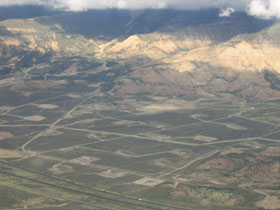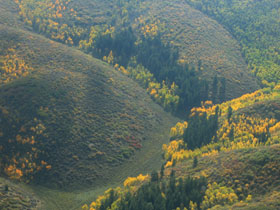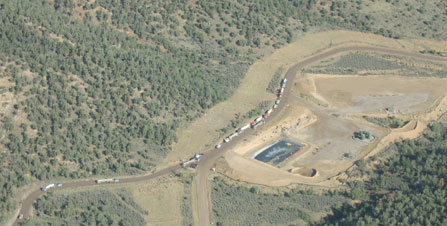Weighing in on Gas Drilling in Colorado
Air Date: Week of October 15, 2004
Gas for home heating and electrical power has greatly expanded across the west under the Bush adminstration. It's controversial, but has it changed any votes in the swing state Colorado? Living on Earth's Ingrid Lobet reports.
Transcript
CURWOOD: It’s Living on Earth. I’m Steve Curwood. Colorado is suddenly in the undecided column. Though it’s gone Republican in eight of the last ten presidential elections, the latest polls find George W. Bush and John Kerry in a dead heat. Since President Bush took office, gas drilling has gone up dramatically in the Rocky Mountain west. Increased demand, record-high prices, new drilling techniques, and the opening up of more public land by the administration are the reasons why.
If you drive at night in western Colorado, where the Rockies slope into the land of painted mesas, you see the glowing towers of drilling rigs. It means more people are finding the energy business has arrived right in their backyards. With the end of the campaign season in sight, Living on Earth's Ingrid Lobet rang doorbells in one gas-rich Republican area of the state to see if this controversial industry is swaying anyone’s vote.
[FOOTSTEPS ON GRAVEL]
TENNISON: This is one of my little things I do is I raise fish
[SOUND OF STUFF IN CAN, WATER]
LOBET: Bill Tennison swings a can full of pellets into the trout pond at his resort ranch in Somerset, Colorado. Looking up, there's a green and yellow sweep of pine and aspen. Looking down, muscular fish thrash in the water.
[SOUND OF FISH FLIPPING IN WATER]
TENNISON: You can see how healthy they are. The small ones are four pounds and they go up to around six pounds.
[SOUND OF FOOTFALL ON GRAVEL. DOOR OPENS, INDOOR ALARM BINGS]
LOBET: Inside his high-ceilinged living room, Tennison tells how the gas boom nearly arrived at his resort this year when the federal Bureau of Land Management decided to auction off drilling rights to land adjoining his property.
TENNISON: The main thing is it included this enormous wetland, a river property, that is a home to eagles, deer, elk, bear, turkey. Every kind of animal you can imagine live here, and sportsmen come. They fish, they hike, they photograph, I mean it's just an outdoor recreation paradise. Well, that was proposed for drilling.
LOBET: Tennison is a financial advisor and voted for George Bush in 2000. He calls himself "late to the game" on environmental questions. But when he perceived a threat to the place he loves, he took out ads in the local paper, organized a letter campaign, even helped form a Colorado chapter of Republicans for Environmental Protection. And he hired an attorney.
TENNISON: If nothing else worked, we were going to buy the lease, to keep it from being drilled. Well, that's a little radical that you have to spend a great amount of money to protect yourself against your own government. That's insanity.
LOBET: In an unusual outcome, the government decided not to auction the land – for now. But it's all gotten Tennison thinking about his fuel-chugging house, 4-wheel-drive truck and off-road vehicles. He'd like to see more government incentives for non-fossil fuels and he wishes his truck could be a hybrid.
TENNISON: We just cannot continue to say let’s drill and drill and drill faster and faster and faster and just turn everything into a drilling field. That’s nuts.
LOBET: Tennison blames government policy for allowing drilling on sensitive lands. So how will he vote?
TENNISON: I think this election has an even bigger issue. When you're at war, you have to have a wartime president. I feel comfortable that President Bush is a wartime president.
 An aerial view of gas wells near Rifle, Colorado. (Photo: Ingrid Lobet)
An aerial view of gas wells near Rifle, Colorado. (Photo: Ingrid Lobet)
[SOUND OF GOATS, ALSO HEAVY TRUCKS ON THE ROAD NEARBY]
LOBET: Horticulturist Diane Light has been living here for seven years in what was a quiet creek valley.
LIGHT: When we first moved here, there was two, maybe three wells within sight and now you can see they’re just everywhere. It used to be so peaceful. There’d be two or three cars going down the road a day, and now it’s 24 hour a day traffic constantly. Over there, they've been spewing gas fumes out of that one for two weeks now. It smells terrible out here about 50 percent of the time.
LOBET: Light knew that someone else held the mineral rights to the gas under her home when she bought it. But she says she was assured that development had already topped out and no more was permitted. I asked her what she's thinking about this election.
LIGHT: I didn't vote in the last one, but I registered to vote in this one.
LOBET: Did this industry have anything to do with your decision to vote this time around?
LIGHT: Oh, absolutely.
LOBET: And of George Bush she says:
LIGHT: He seems to be more of "we need to fuel America with gas” rather than looking at any other options. And I don't care for that. I'm going to vote for John Kerry.
[GOATS BLEAT]
LOBET: Knowing where to direct discontent over drilling can be complicated. Sometimes gas is on federal land and it's the government that leases to gas companies. But in Diane Light's case, the land around her is private and it's an old-time rancher who owns the rights. That rancher is 87-year-old Marvel Couey, who lives just a few minutes away, up above on the grassy mesa.
[SOUND OF CHIMES AND KITTENS]
LOBET: Marvel Couey says she still runs cattle on some of the 7,000 acres that were her great-grandparents'. But she says even though she owns the gas rights, she has little say over gas operations.
COUEY: It's been a horror. It's turned my ranch into a gas company. If they want to put a well right here, I can possibly get them to put it just a little bit aways, but that usually isn't the case.
LOBET: How can that be, if she controls the gas rights?
COUEY: Because a long time ago, be maybe like 50, 60 years ago, my husband signed a lease for them to put a well every 360 acres—way spaced out. And that went on for years and years and years and nobody touched it. And everybody forgot all about it. Until suddenly some little ol’ company slipped in here, and before we knew what was happening we were in this big mess.
LOBET: Couey says the lawyers at that time didn't understand the industry and drafted poor contracts. This rancher is a lifelong Republican. She calls John Kerry "that other one.” But she doesn't much care for President Bush either.
COUEY: Bush is not…he don't care whether they take down our forests or not. As far as he's concerned, they can cut our forests up, too. I don't know who I'm going to vote for.
[DIFFERENT CHIMES, INSIDE. THUNDER AND BIRDS]
LOBET: There's one vote George Bush has lost over gas drilling in western Colorado. That's real estate agent and paralegal Lisa Bracken's.
|
|
LOBET: But a lot has changed for Bracken since then. We stand near a gas well in the town of Silt, a well that earlier this year leaked gas laced with the carcinogen benzene into the creek near her house. She worries about her drinking water and she worries about what she sees as the interruption of the landscape. BRACKEN: This spring when they were putting the pipelines in, the elk were coming down out of the high country like they do every year – this is an ancient migratory route. And we had a herd come down. They calved right where the Schwarz well is. And they encountered the heavy equipment, they didn't know what to do with the pipeline ditch, there’s a huge, huge excavated area where they were laying the pipeline in. And they were just madly running across the road, getting hung up in the fencing and they were panicked. To see this happen to a place that is so near and dear, it's just very, very, very disturbing. LOBET: Of her vote this year, Bracken says:
|

 EnCana, one of North America’s largest oil and gas producers, plans to start drilling for gas on the Roan Plateau in Western Colorado. (Photo: Ingrid Lobet)
EnCana, one of North America’s largest oil and gas producers, plans to start drilling for gas on the Roan Plateau in Western Colorado. (Photo: Ingrid Lobet)  Residents complain of fumes and noise from truck traffic on rural roads. (Photo: Ingrid Lobet)
Residents complain of fumes and noise from truck traffic on rural roads. (Photo: Ingrid Lobet) 



